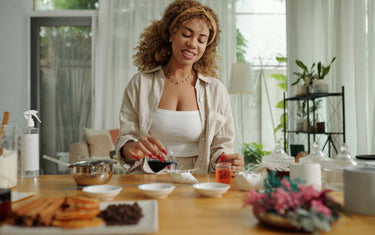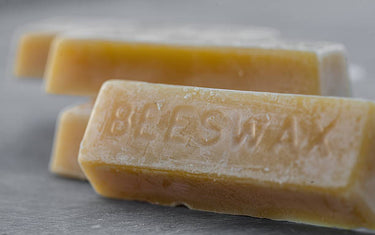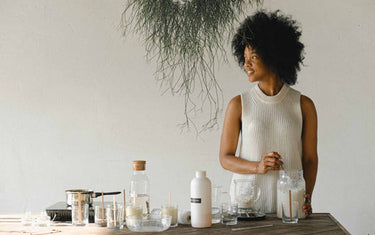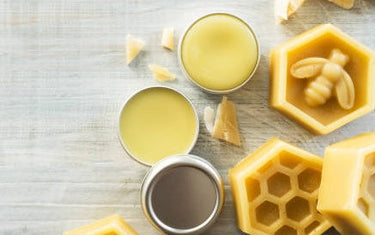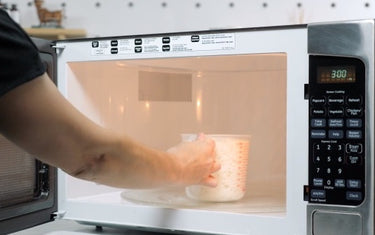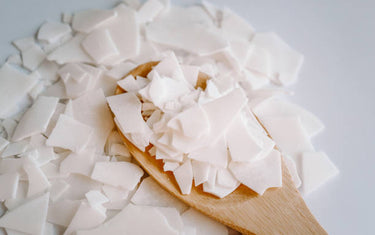5 min read / 2 February 2023 / Laura Garvin Gomez
How to Make Antibacterial Hand Wash
Take power over your hygiene routine with this easy-to-follow DIY hand wash recipe.
Share this post
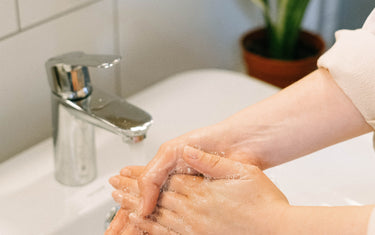
We've all witnessed the importance of hygiene these past few years.
The responsibility to keep our health in check has been constantly rising, and many of us have been filling our homes to the brim with unique-smelling lotions and potions as a result.
While these can certainly hold their own benefits now and then, it can be pretty easy to question what exactly goes into every sparkly shop-bought bottle - and what it's doing for our cleanliness overall.
Making your own DIY antibacterial hand wash can not only provide you with assurance on the ingredients, but also give you a simple yet effective tool for sharing with your friends and loved ones.
Crafting soaps by hand opens up the opportunity to add essential oils into the mix too, leaving your hands smelling great while also tackling bacteria the natural way.
With that in mind, we'll be detailing our favourite DIY antibacterial soap recipe using essential oils.

How to Make Antibacterial Hand WashIf you're looking to save a pretty penny on hand soaps around your home, or if you're after a more natural way to up your hygiene routine, this quick and simple recipe can set you on the right track. You will need:
Step 1: Choose your containerThe above advice is based on a 1 litre sized container, however feel free to modify the amounts dependant on the size of the dispenser you're using. If you choose to use an old shop-bought dispenser, we recommend rinsing it thoroughly before use. Step 2: Prepare your ingredientsCarefully empty your castile liquid soap into a jug. Try not to use a bowl for this step, as it could be much harder to pour the mixture back in later! Add in your sweet almond oil. Then, measure out and add your essential oils. We recommend a 1% dilution rate for any quantity you're using, so be careful not to be too heavy-handed when measuring. Step 3: Mix it all togetherIf you're wanting to add food colouring to your soap, drop this in here. Then, proceed to slowly mix your oils together with a whisk or electric mixer (whichever is preferable). Once fully blended, pour carefully back into the bottle, and you're done! |
Why should I use tea tree and eucalyptus essential oils?
Known as "the medicine cabinet in a bottle", tea tree oil is packed with more antibacterial properties than almost any other essential oil on the market.
Used for everything from reducing acne build-up to tackling dandruff, the antimicrobial properties of tea tree have been revered by aromatherapists and scientists alike - with a large 2002 reviewconfirming these effects across a number of common infections.
Eucalyptus oil, on the other hand, carries a refreshing scent that can not only help to clear the airways, but also protect your body from illness in the first place.
Like tea tree, eucalyptus oil has been studied for its effects against bacteria and has been proven to tackle staph as well as E. coli strains in testing.
If you're not a fan of the herbaceous scent profile, or you had other aromas in mind for your soap, feel free to use any other essential oil of your choosing.
Many of them contain antimicrobial properties of note, and they can also add other benefits to your soap - like calming or energising qualities.
Some other popular antibacterial essential oils include:
- Lavender essential oil
- Rosemary essential oil
- Bergamot essential oil
- Thyme essential oil
- Clove leaf essential oil

What is castile soap?
Castile soap is a vegetable-based soap that is made without synthetics and without animal fat.
It can be found on most DIY online retailers and is generally considered the best way to find a "pure soap" base that is still vegan-friendly.
If you would rather not use castile for your hand wash, some other popular options include glycerine, or a biodegradable base like shea butter.
Alternatively, you can try melting existing soap bars you may have constructed in the past.
If you're interested in making your own soap bars at home, you can follow our beginner's guide as a good starting point.
What's the benefit of using carrier oils for soap?
Carrier oils, like sweet almond oil, are natural and unsaturated fats typically derived from seeds, nuts, or vegetables.
While they're mostly valued in cold pressed soaps for their ability to maintain the bar's firmness, they are also a worthy asset in liquid soaps as they can help improve the longevity of your chosen mixture.
Carrier oils can also provide additional benefits for your soap, such as moisturising properties for the skin as well as a host of healthy fats and vitamins.
Learn more about carrier oils and their benefits.

How do I achieve the full benefits of my antibacterial hand wash?
No matter what kind of hand soap you choose, none will be totally effective unless you wash your hands in the proper way.
It will certainly be more tempting to use your own DIY soap as opposed to a shop-bought version, but regardless you should always keep note of the following method:
- Run the tap with warm water.
- Rub the soap in your hands until it lathers completely across your palms, fingers, wrists, and fingernails.
- Continue to wash your hands in this fashion for at least 15-20 seconds before rinsing your hands well.
With this technique in mind, you can be assured that both the strength of the soap and the goodness of the essential oils will be properly integrated into your hands.
Are there any precautions?
Like many natural products, essential oils are known for being extremely potent on the skin - especially when undiluted.
Though they're sufficiently weakened once in the soap mixture, it's always a good idea to carefully monitor the amount of oil you're putting in.
Any more than 1% could risk a reaction, and more vulnerable people such as children or the elderly should opt for an even lower percentage still.
If you've never used essential oils before, or if you're prone to allergies, its also advised to perform a patch test of your soap before use.

Making your own DIY antibacterial hand wash is a great way to naturally combat microbes while still understanding the base of your products.
It's also a fun gift idea for those around you, so feel free to try as many different scent combinations as you'd like.




